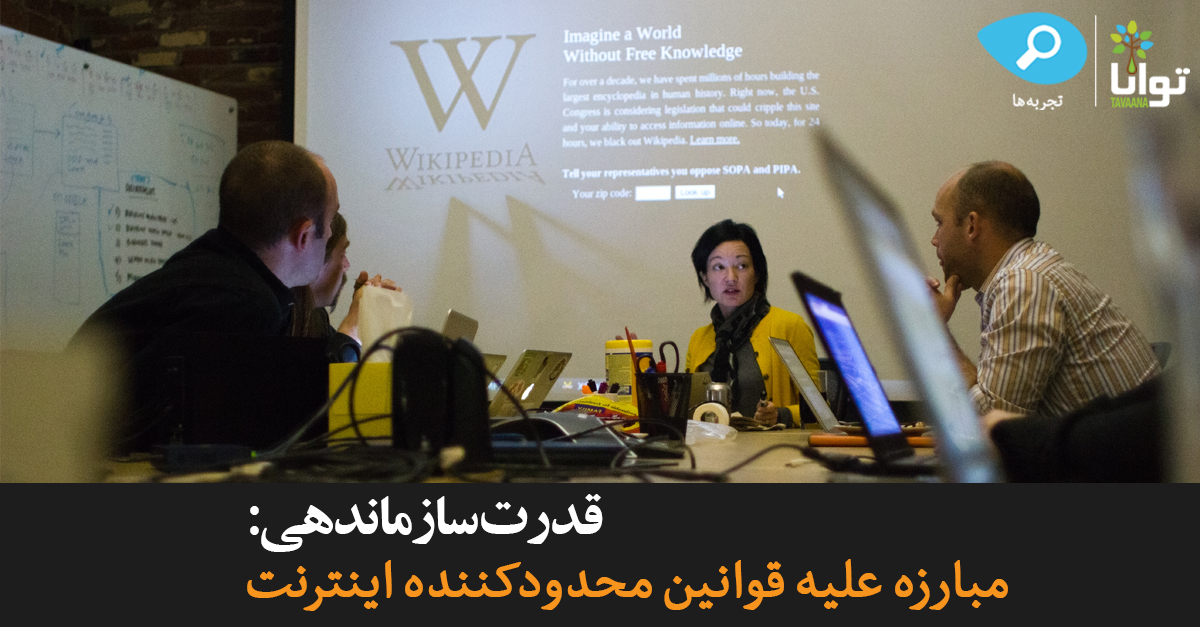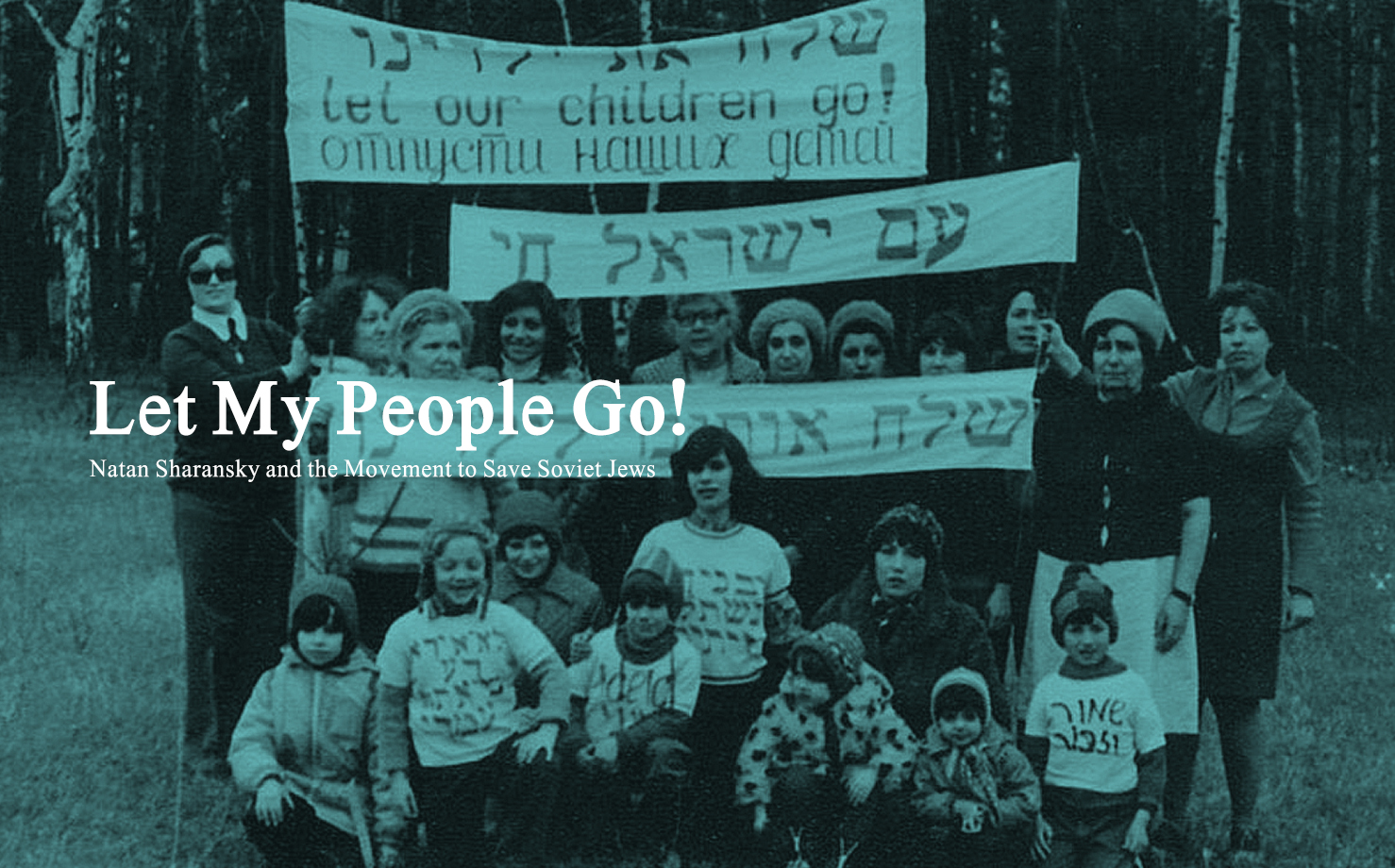Vision and Motivation
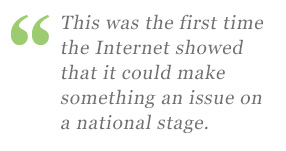 In May and October 2011, two bills intended to fight online piracy were introduced in the US Congress. They were supported not only by media corporations, but also by a broad bipartisan coalition. At the start of 2012, the bills were still largely unnoticed by the American public, and their passage into law seemed assured. However, in the course of just one month, the bills became headline news, and massive public pressure, driven by an online civic movement, pushed Congress to drop both pieces of legislation. As one Representative wrote, an “Internet mutiny paired with calls from people across the country [were] responsible” for this remarkable reversal.[1]
In May and October 2011, two bills intended to fight online piracy were introduced in the US Congress. They were supported not only by media corporations, but also by a broad bipartisan coalition. At the start of 2012, the bills were still largely unnoticed by the American public, and their passage into law seemed assured. However, in the course of just one month, the bills became headline news, and massive public pressure, driven by an online civic movement, pushed Congress to drop both pieces of legislation. As one Representative wrote, an “Internet mutiny paired with calls from people across the country [were] responsible” for this remarkable reversal.[1]
The Protect Intellectual Property Act (PIPA) in the Senate and the Stop Online Piracy Act (SOPA) in the House of Representatives were designed to take down foreign websites hosting pirated content, but the legislation granted the government and businesses broad powers. It would make Internet service providers block access to those websites using Domain Name System (DNS) blocking – the same technique used for censorship in China and Iran – and force search engines to remove links to those sites. US-based advertisers, like Google Adwords, and online payment systems, such as Paypal, would have to cancel those websites’ accounts in order to cut off their funding. Finally, it would make websites with user-generated content, such as Facebook, YouTube, and Twitter, liable for links to infringing sites posted by their users; businesses could sue these websites to force them to remove the links, and the sites themselves could even be blocked.[2]
The bills started as an uncontroversial, bipartisan effort to fight piracy and protect copyright, bolstered by support from the film and music industries. However, technology media outlets like Wired and Techdirt, as well as Internet freedom defenders like the Electronic Frontier Foundation and Fight for the Future, soon began to sound the alarm.[3] They charged that not only would the bills be ineffective at stopping piracy, they would violate the free and open nature of the Internet by granting the government overly broad discretion to censor websites. They also believed the legislation would stifle innovation by discouraging new start-ups, as website founders would have to either screen all content submitted to websites by users, at great expense, or face a lawsuit.[4] One opponent called SOPA and PIPA the “equivalent of blowing up every road, bridge and tunnel in New York to keep people from getting to one bootleg [DVD] stand in Union Square.”[5]
In January 2012, Congress would vote on SOPA in a House of Representatives committee and debate PIPA on the Senate floor. As awareness of the bills spread, the tech community and ordinary Internet users began to mobilize to find a way to stop the bills that they believed would “break the Internet.”
Goals and Objectives
In order to prevent Congress from passing SOPA and PIPA, the bills’ opponents had two objectives: to raise the public’s awareness of the legislation and its potential repercussions, and to encourage people to contact their representatives in Congress to influence them to vote against the bills. In some cases, activists also sought to sway corporations’ stance on SOPA and PIPA.
Efforts to raise awareness included open letters, multimedia, and ultimately coordinated website blackouts. Open letters and white papers from Internet companies, technology experts, and law professors provided detailed analyses of the risks of SOPA and PIPA, from “new potential security threats” to “grave constitutional problems,” and urged Congress to reconsider the legislation. Fight for the Future’s “PROTECT IP / SOPA Breaks the Internet” video provided a visually engaging and detailed analysis of the pitfalls of the legislation, while also calling on viewers to contact Congress.
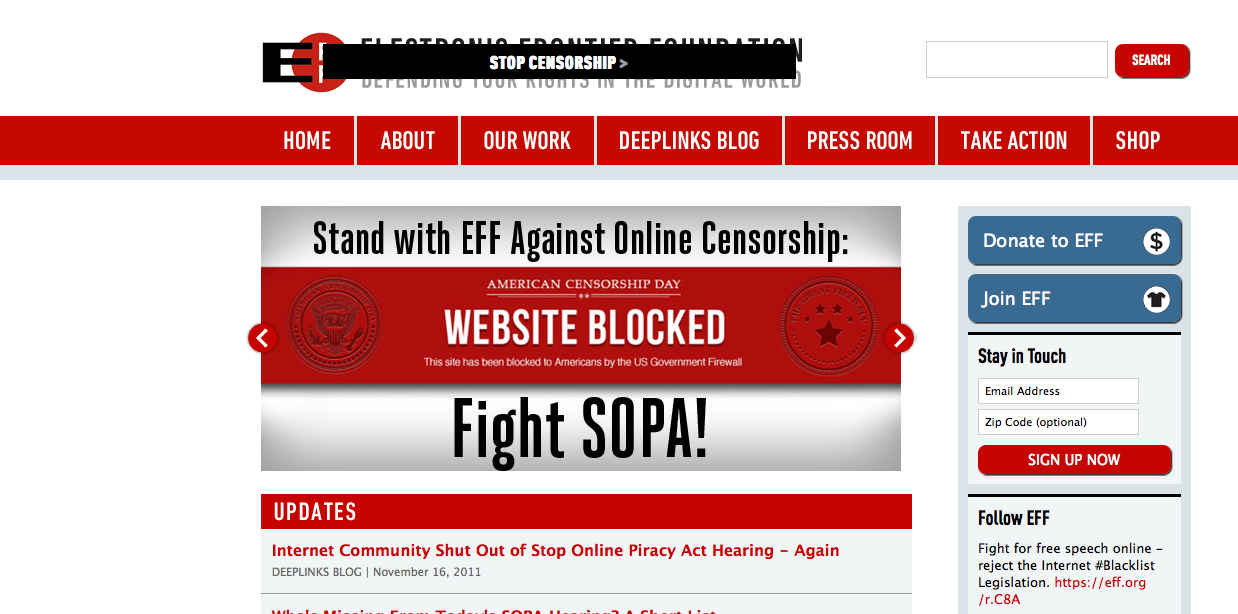 On November 16, the day of a congressional hearing on the legislation, Fight for the Future helped organize “American Censorship Day,” on which more than 5,000 sites, including Tumblr and Reddit, raised awareness by “censoring” their sites.[6] Tumblr, for example, removed images and covered up a text on users’ dashboards with a banner warning, “Congress is holding hearings today and will soon pass a bill empowering corporations to censor the Internet, unless you tell them no.”[7] 80,000 people were inspired to call Congress.[8]
On November 16, the day of a congressional hearing on the legislation, Fight for the Future helped organize “American Censorship Day,” on which more than 5,000 sites, including Tumblr and Reddit, raised awareness by “censoring” their sites.[6] Tumblr, for example, removed images and covered up a text on users’ dashboards with a banner warning, “Congress is holding hearings today and will soon pass a bill empowering corporations to censor the Internet, unless you tell them no.”[7] 80,000 people were inspired to call Congress.[8]
At the same time, consumers began to turn against some of the corporations that had expressed support for SOPA and PIPA. On December 22, a Reddit user posted that he was transferring 51 domains away from the registrar GoDaddy to protest their support of SOPA, and proposed that others do the same on December 29, declared “Dump GoDaddy Day.” Within a day, the founder of Wikipedia and the creator of the humor site “I Can Haz Cheezburger” announced that they would be transferring over 1,000 domains from GoDaddy, and the day after the Reddit post, GoDaddy withdrew its support for SOPA.[9] However, consumers continued to transfer domains, demanding that GoDaddy announce full opposition to SOPA; in less than a week, the company lost over 72,000 domains.[10] On “Dump GoDaddy Day,” the company announced its opposition to SOPA, conceding, “We have observed a spike in domain name transfers, which are running above normal rates and which we attribute to GoDaddy’s prior support for SOPA, which was reversed.”[11]
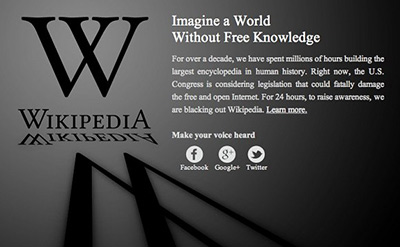 Meanwhile, communities of users on Wikipedia, Reddit, and other websites debated shutting the sites down entirely for a day in order to raise awareness. Months of coordination culminated in the “SOPA Strike” on January 18, 2012, when more than 115,000 websites were “blacked out” or “censored” by their owners to raise awareness.[12] Internet users who tried to view a Wikipedia page, for instance, instead saw only a warning about SOPA/PIPA, topped by a banner reading “Imagine a world without free knowledge.” Google blacked out its logo, linking to an online anti-SOPA/PIPA petition. Other websites followed their lead.
Meanwhile, communities of users on Wikipedia, Reddit, and other websites debated shutting the sites down entirely for a day in order to raise awareness. Months of coordination culminated in the “SOPA Strike” on January 18, 2012, when more than 115,000 websites were “blacked out” or “censored” by their owners to raise awareness.[12] Internet users who tried to view a Wikipedia page, for instance, instead saw only a warning about SOPA/PIPA, topped by a banner reading “Imagine a world without free knowledge.” Google blacked out its logo, linking to an online anti-SOPA/PIPA petition. Other websites followed their lead.
On that day, SOPA/PIPA became the top “trending topic” on Twitter; in fact, users posted nearly four million SOPA-related tweets, almost all of them opposing the legislation.[13] Meanwhile, members of Congress received a wave of 8 million calls, 4 million emails, and 10 million petition signatures; the Senate’s website was unable to accommodate the number of people who tried to use its contact forms to reach their representatives.[14] As one Congressman said, “All of a sudden members of Congress were asking their staff, ‘What is this SOPA thing and why am I getting hundreds of calls about it?’ and rethinking what the recording industry lobbyists had been telling them.”[15]
The day before the blackout, 80 legislators supported the bills, and 31 were opposed. By the day after the protest, the tide had shifted, with 101 against SOPA/PIPA and only 65 in favor.[16] Many referred to the calls and emails they had received as they affirmed their opposition. On January 20, Senator Harry Reid and Representative Lamar Smith indefinitely postponed the vote on SOPA and PIPA, effectively “killing” the bills.
Leadership
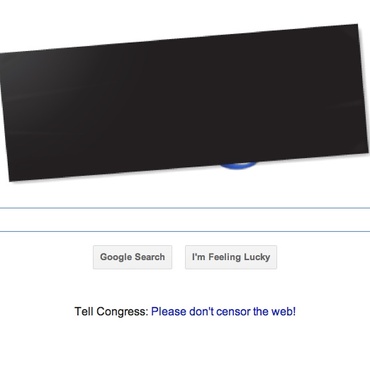 The movement against SOPA and PIPA was driven by a loose coalition made up of many parts: pro-Internet freedom organizations such as Fight for the Future, which helped coordinate and publicize the massive online protests; technology blogs like Techdirt, which raised civic awareness about the bills online; and users of sites like Reddit and Wikipedia, who pushed those sites to participate in the “SOPA Strike” and contacted Congress to express their opposition to the bills.
The movement against SOPA and PIPA was driven by a loose coalition made up of many parts: pro-Internet freedom organizations such as Fight for the Future, which helped coordinate and publicize the massive online protests; technology blogs like Techdirt, which raised civic awareness about the bills online; and users of sites like Reddit and Wikipedia, who pushed those sites to participate in the “SOPA Strike” and contacted Congress to express their opposition to the bills.
Between October and December 2011, groups like Fight for the Future worked to raise awareness of the potential dangers of SOPA and PIPA through online campaigns. Fight for the Future, the Electronic Frontier Foundation, and other groups coordinated with each other through an email list, where they debated what their message should be and whether website blackouts could be effective, worked on tools to help protesters contact Congress, and determined talking points for discussions with lawmakers.[17]
At the same time these groups were strategizing, blogs like TechDirt were relentlessly publicizing the legislation and its potential repercussions. In fact, TechDirt founder Mike Masnick had been writing about the legislation on a daily basis – sometimes many times a day – ever since PIPA passed through a Senate committee on May 2011.[18] They worked to publicize the potential dangers of the legislation and the way it was being pushed through the legislative process with little debate.
Meanwhile, tech-savvy Internet users, particularly at Reddit, mobilized for action. They pushed for online protests such as “American Censorship Day” and the “SOPA Strike” and organized the boycott of GoDaddy as punishment for its support of the bills. The technology industry also supported the movement against SOPA and PIPA, with Google, Mozilla, Facebook, Twitter, eBay, Yahoo, and AOL all writing a letter of concern to Congress in November 2011. However, it was the users of these services who pushed the issue to the forefront. As Reddit’s co-founder said, “This was the first time the Internet showed that it could make something an issue on a national stage.”[19]
Civic Environment
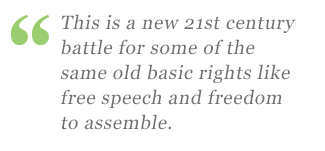 SOPA and PIPA were natural outgrowths of the ongoing battle against movie and music piracy waged by the Motion Picture Association of America (MPAA) and the Recording Industry Association of America (RIAA). Since the early 1990s, these organizations had been coordinating their resources to lobby for legislation combating media piracy. Because their efforts were so effectively focused on a single policy issue, and because of their financial clout, their influence on members of Congress was correspondingly great. The Internet technology industry, in contrast, had not established such a presence in Washington. As a result, SOPA’s 32 co-sponsors received four times more in campaign contributions from the entertainment industry than from the technology industry.[20]
SOPA and PIPA were natural outgrowths of the ongoing battle against movie and music piracy waged by the Motion Picture Association of America (MPAA) and the Recording Industry Association of America (RIAA). Since the early 1990s, these organizations had been coordinating their resources to lobby for legislation combating media piracy. Because their efforts were so effectively focused on a single policy issue, and because of their financial clout, their influence on members of Congress was correspondingly great. The Internet technology industry, in contrast, had not established such a presence in Washington. As a result, SOPA’s 32 co-sponsors received four times more in campaign contributions from the entertainment industry than from the technology industry.[20]
The MPAA and RIAA were joined by cable and broadcast corporations; led by Comcast, Viacom, News Corp., and Time Warner, they spent millions of dollars to lobby Congress to support the bills.[21] Chris Dodd, CEO of the MPAA, threatened to cut off Hollywood’s financial support to President Obama’s re-election campaign due to the administration’s opposition to SOPA/PIPA: “Those who count on ‘Hollywood’ for support need to understand that this industry is watching very carefully who’s going to stand up for them when their job is at stake. Don’t ask me to write a check for you when you think your job is at risk and then [ignore] me when my job is at stake.”[22]
Opposing these highly organized, well-funded lobbyists were ordinary grassroots cyber activists, Internet freedom groups, and the tech industry. Although SOPA and PIPA’s passage seemed assured, a few opponents of the legislation in Congress managed to slow the bills’ momentum by delaying the final vote.[23] This gave groups like Fight for the Future and ordinary Internet users crucial time to raise awareness and mobilize the online campaign against the bills. While the MPAA and RIAA were able to influence Congress, they were not as able to convince the public that the legislation was necessary or effective. Ultimately the people, not the media industry, prevailed.
Even Chris Dodd admitted that his opponents’ “ability to organize and communicate directly with consumers” was a “watershed event” the likes of which he had never seen.[24] By directly reaching ordinary Internet users with a clear call to action, the anti-SOPA/PIPA movement was able to create a wave of direct public pressure on Congress that transformed the situation. As Dodd himself said, “This was a whole new different game all of a sudden…This thing was considered by many to be a slam dunk.”[25]
Message and Audience
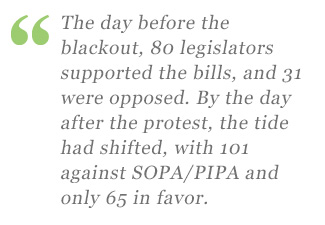 SOPA and PIPA’s opponents communicated the bills’ potential negative repercussions, and also called on Internet users to take action in order to stop the bills from becoming law. They described the chilling effect the legislation could have on freedom of expression, innovation, and even job creation. As one opponent wrote, “This bill turns us all into criminals. If it passes, then you either stop using the Internet, or you simply hope that you never end up in the crosshairs, because if you’re targeted, you will be destroyed by this bill…[It] will kill American innovation and development of the Internet, as it will become too risky to do anything of value” for fear of legal repercussions.[26]
SOPA and PIPA’s opponents communicated the bills’ potential negative repercussions, and also called on Internet users to take action in order to stop the bills from becoming law. They described the chilling effect the legislation could have on freedom of expression, innovation, and even job creation. As one opponent wrote, “This bill turns us all into criminals. If it passes, then you either stop using the Internet, or you simply hope that you never end up in the crosshairs, because if you’re targeted, you will be destroyed by this bill…[It] will kill American innovation and development of the Internet, as it will become too risky to do anything of value” for fear of legal repercussions.[26]
Opponents also focused on the ethical aspects of the legislation, pointing out that creating a blacklist of websites would violate the Constitution and fundamental American principles of freedom of speech. Finally, they argued that SOPA and PIPA would not even achieve their stated goal of deterring piracy, as copyright violators could find ways to circumvent all the bills’ provisions; moreover, the bills focused only on censoring links rather than removing copyrighted content itself.[27]
Activists’ general messaging to the public focused on the drastic transformation they believed the Internet would suffer, and the impact on Internet users themselves, if the bills passed. On the “SOPA Strike” day, Wikipedia asked users to “imagine a world without free knowledge,” saying that the bills “could fatally damage the free and open Internet.” Reddit wrote that they “could radically change the landscape of the Internet,” and that they “would restrict innovation and threaten the existence of websites with user-submitted content, such as Reddit.” Crucially, these messages were coupled with direct calls to action urging Internet users to contact their representatives in Congress or sign anti-SOPA/PIPA petitions.
Outreach Activities
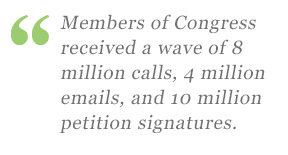 As Americans worked to stop SOPA and PIPA, they attracted international attention, including that of European Internet freedom activists. The international Anti-Counterfeiting Trade Agreement (ACTA), similarly intended to fight piracy, had already been signed by the United States, Japan, Canada, and several European countries. Critics claimed it was undemocratic, as it had been developed by European officials without input from legislators or any option for modifying it; they also said it would make Internet service providers liable for users’ copyright infringement and “establish a de facto…Internet police.”[28] However, the European Parliament had not yet ratified it. European activists rallied together and organized widespread protests to put pressure on the legislators. As one protest leader said, “We saw what the combination of protest and political pressure achieved with the dropping of SOPA.”[29] After months of public protest, the European Parliament overwhelmingly voted to reject ACTA; as one MEP said to activists, “Your protesting won it.”[30]
As Americans worked to stop SOPA and PIPA, they attracted international attention, including that of European Internet freedom activists. The international Anti-Counterfeiting Trade Agreement (ACTA), similarly intended to fight piracy, had already been signed by the United States, Japan, Canada, and several European countries. Critics claimed it was undemocratic, as it had been developed by European officials without input from legislators or any option for modifying it; they also said it would make Internet service providers liable for users’ copyright infringement and “establish a de facto…Internet police.”[28] However, the European Parliament had not yet ratified it. European activists rallied together and organized widespread protests to put pressure on the legislators. As one protest leader said, “We saw what the combination of protest and political pressure achieved with the dropping of SOPA.”[29] After months of public protest, the European Parliament overwhelmingly voted to reject ACTA; as one MEP said to activists, “Your protesting won it.”[30]
While there are no plans to re-introduce SOPA or PIPA in Congress, efforts to control the free flow of information online continue, on both local and global levels. In the December 2012 meeting of the UN agency the International Telecommunications Union, members considered a proposal that would allow governments or multi-government bodies to use “security” or other justifications to regulate or censor the Internet.[31] The United States led a bloc of 55 countries that did not sign the treaty, but 89 other states did sign it, demonstrating that, as Google stated, “many governments want to increase regulation and censorship of the Internet.”[32]
In order to capitalize on the momentum of the campaign against SOPA/PIPA, groups that helped organize that campaign formed the Internet Defense League in July 2012. Fight for the Future, Mozilla, Reddit, and other groups created this coalition to make it easier to mobilize for future campaigns in defense of Internet freedom. As a co-founder of Fight for the Future put it, “This is a new 21st century battle for some of the same old basic rights like free speech, freedom to assemble, and the League is here to fight and to win and to help Web users stay engaged.”[33] While efforts to control and censor online information will continue, the success of the fight against SOPA/PIPA demonstrates the power of online civic organizing to raise awareness and inspire ordinary people to take action to defend their basic human rights online.
Learn More
News & Analysis
Franzen, Carl. “How the Web Killed SOPA and PIPA.” TPM Idea Lab. 20 Jan. 2012.
Harvey, Jason. “A technical examination of SOPA and PROTECT IP.” The Reddit Blog. 17 Jan. 2012.
Sengupta, Somini. “Big Victory on Internet Buoys Lobby.” The New York Times. 26 Jan. 2012.
Multimedia
Al Jazeera English. “Fault Lines: Controlling the Web.” 7 Aug. 2012.
Berkman Center for Internet & Society. “RB 196: The Rally Cry of SOPA.” 1 April 2012.
Fight for the Future. “PROTECT IP / SOPA Breaks the Internet.” 25 Oct. 2011.
Footnotes
[1] Franzen, Carl. “How the Web Killed SOPA and PIPA.” TPM Idea Lab. 20 Jan. 2012.
[2] Harvey, Jason. “A technical examination of SOPA and PROTECT IP.” The Reddit Blog. 17 Jan. 2012. Zittrain, Jonathan, Kendra Albert, and Alicia Solow-Niederman. “A close look at SOPA.” The Future of the Internet and How to Stop It. 2 Dec. 2011.
[3] Benkler, Yochai. “SOPA/PIPA: A Case Study in Networked Discourse and Activism.” Personal Democracy Forum. 11 June 2012.
[4] Heald, Chris. “Why SOPA Is Dangerous.” Mashable. 17 Jan. 2012. Masnick, Mike. “An Updated Analysis: Why SOPA & PIPA Are a Bad Idea, Dangerous & Unnecessary.” Techdirt. 18 Jan. 2012.
[5] Topolsky, Joshua. “SOPA and PIPA: The wrong tools to combat online piracy.” The Washington Post. 18 Jan. 2012.
[6] Dickinson, Boonsri. “The Largest Online Protest in History Started Here.” Business Insider. 19 Jan. 2012.
[7] Kincaid, Jason. “Tumblr Takes Fight Against SOPA Up a Notch, ‘Censors’ User Dashboards.” TechCrunch. 16 Nov. 2011.
[8] Dickinson.
[9] Kumparak, Greg. “GoDaddy No Longer Supports SOPA.” TechCrunch. 23 Dec. 2011.
[10] Gamet, Jeff. “GoDaddy SOPA Support Leads to Domain Exodus.” The Mac Observer. 26 Dec. 2011.
[11] McCullagh, Declan. “GoDaddy bows to boycott, now ‘opposes’ SOPA copyright bill.” CNET News. 29 Dec. 2011.
[12] Wortham, Jenna. “Public Outcry Over Antipiracy Bills Began as Grass-Roots Grumbling.” The New York Times. 19 Jan. 2012.
[13] Fitzpatrick, Alex. “Internet Users to Congress: We Hate SOPA.” Mashable. 19 Jan. 2012.
[14] Greenberg, Andy. “How Reddit’s Alexis Ohanian Became the Mayor of the Internet.” Forbes. 25 June 2012.
Ingraham, Nathan. “US Senate websites hit with technical difficulties following SOPA blackout.” The Verge. 18 Jan. 2012.
[15] Greenberg.
[16] Berkman Center for Internet & Society. “RB 196: The Rally Cry of SOPA.” 1 April 2012.
[17] Gross, Grant. “Who really was behind the SOPA protests?” Computerworld. 3 Feb. 2012.
[18] Downes, Larry. “Who Really Stopped SOPA, and Why?” Forbes. 25 Jan. 2012.
[19] Hill, Kashmir. “Reddit Co-Founder Alexis Ohanian’s Rosy Outlook on the Future of Politics.” Forbes. 2 Feb. 2012.
[20] ErnstFriedman, Jeffrey. “Sponsors of SOPA Act Pulled in 4 Times as Much in Contributions from Hollywood as from Silicon Valley.” MapLight. 19 Dec. 2011.
[21] Goldman, David. “Millions in SOPA lobbying bucks gone to waste.” CNNMoney. 27 Jan. 2012.
[22] “Exclusive: Chris Dodd warns of Hollywood backlash against Obama over the anti-piracy bill.” Fox News. 19 Jan. 2012.
[23] Cieply, Michael and Edward Wyatt. “Dodd Calls for Hollywood and Silicon Valley to Meet.” The New York Times. 19 Jan. 2012.
[24] Fernandez, Jay A. “Sundance 2012: MPAA’s Chris Dodd Calls Piracy Defeat a ‘Watershed Event’.” Hollywood Reporter. 24 Jan. 2012.
[25] Cieply and Wyatt.
[26] Heald.
[27] Harvey.
[28] Pfanner, Eric. “European Parliament Rejects Anti-Piracy Treaty.” The New York Times. 4 July 2012.
[29] Plunkett, John. “Acta opposition grows as Pirate Party UK joins day of action.” The Guardian. 6 Feb. 2012.
[30] Bosch, Torie. “European Parliament’s Rejection of ACTA Demonstrates Again the Power of Digital Activism.” Slate. 4 July 2012.
[31] Shapiro, Gary. “Global Internet Users Need SOPA-PIPA Moment.” Forbes. 10 Oct. 2012.
[32] Khalil, Ali. “The UN Approved a Treaty Said to Let Governments Censor the Internet.” Business Insider. 14 Dec. 2012. Thomson, Amy. “UN Telecom Treaty Approved Amid U.S. Web-Censorship Concerns.” Bloomberg. 14 Dec. 2012.
[33] Franzen, Carl. “Internet Defense League Forms to Fight Next SOPA and PIPA.” TPMIdeaLab. 19 July 2012.

